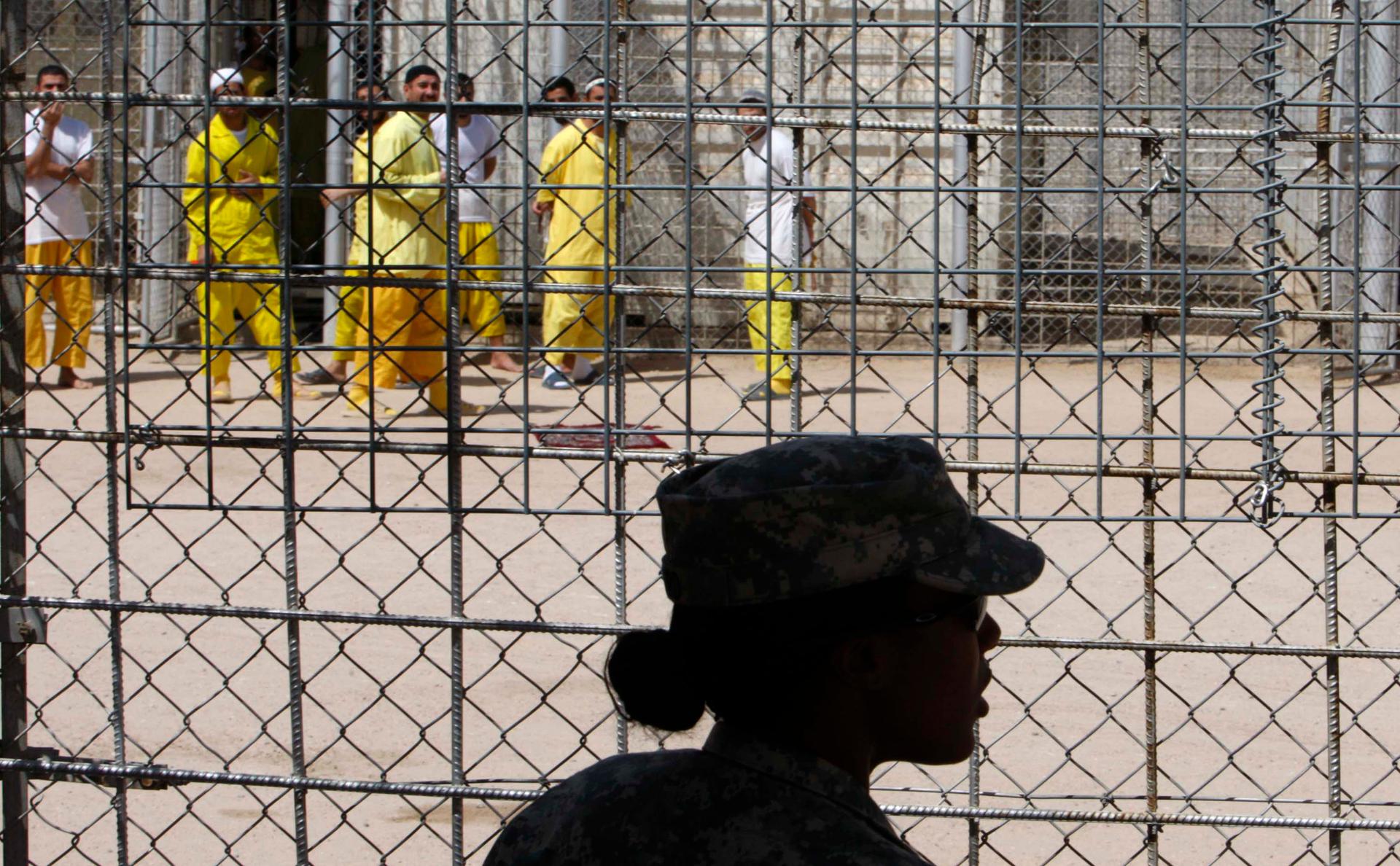Meet the US prison camp that helped give birth to ISIS
A U.S. soldier keeps watch as detainees spend time at Camp Bucca in southern Iraq September 16, 2009.
There's a common thread that ties nine of today's top leaders of the terrorist group known as ISIS — all served time in a US prison camp on the Iraqi-Kuwait border known as Camp Bucca.
The camp was used during the US occupation of Iraq to detain members of Saddam Hussein's Ba'athist party and others suspected of fighting against the US intervention. And one of its problems was that it lumped together secular Iraqi men who were simply loyal to the old regime with Islamic extremists fighting against Western influence.
According to The Independent, Camp Bucca was home to ISIS leader Abu Bakr al-Baghdadi, his number two Abu Muslim al-Turkmani, ISIS senior military leader Haji Bakr and the head of ISIS foreign fighters Abu Qasim. While they were almost certainly radical when they entered the prison, they most likely left more radical, more organized and more well-connected to Iraq's Ba'athists — a partnership that we've seen play out as ISIS seized territory across Iraq. Eventually, the prisoners were released. At the time, a local official questioned the wisdom of putting extremists back on the streets.
(Editor's note: The Global Scan can be delivered straight to your inbox every weekday. Just register and sign up today.)
In the US election, what you eat may be as important as how you vote
Money plays a huge role in US elections — funding TV ads, robo-calls to voters, polling and the crucial get-out-the-vote drives on election day. And much of that money comes from corporate America — the big companies that sell Americans their food, furnishings and stuff of daily life. So in some ways, citizens are voting every day with their dollars, when they choose what to buy.
Now, a new app called BuyPartisan aims to help Americans know which political parties they may be inadvertently supporting when they pick a certain drink or snack or paper towel. The app, from a company called Spend Consciously, tracks donations to political parties by the boards of directors, CEOs, political action committees and employees of various companies. Then it matches a grocery item to those donations.
Good Magazine used the app to evaluate some common snacks. Take Cheese Straws from Dean Foods, for example: 60 percent of the company donations go to Republican candidates and less than 30 percent to Democrats. How about Honest Fizz Root Beer from Coca-Cola? 43 percent of its contributions go to Republicans and just 22 percent to Democrats. Meanwhile, Unilever, the company that owns Ben and Jerry's, directs nearly 72 percent of its contributions to Democrats and less than 10 percent to Republicans.
Did conservationists go too far in efforts to save the gray wolf?
Gray wolves were near extinction when the US government stepped in the 1990s and reintroduced them in the American West. As the wolves came back, so did complaints from ranchers who were losing livestock to the animals. But conservationists held on, using lawsuits to fight attempts to remove the wolf from the endangered species list. Now, their success may be coming back to haunt them.
The dispute became so rancorous that Congress stepped in and took the gray wolf off the endangered list in 2011 — which turned the endangered label into a political act rather than a fact-based decision made by the US Fish and Wildlife Service. PRI's The Takeway reports that environmentalists fear the precedent could lead to Congress managing the list of endangered species whenever it is politically expedient to do so.
Sir, you are either a drug user or pregnant
When an Egyptian bus driver needed to submit a urine sample to prove he was not taking drugs, he decided to give a sample of his wife's urine. However, he didn't realize his wife was two months pregnant. The test detected that in the urine and officials congratulated the man — and then busted him.
Funny, yes. But according to the BBC's News from Elsewhere blog, the story shows how widespread drug abuse has become in Egypt, with one news show claiming drugs are as easy to get as cigarettes. The prescription painkiller tramadol is especially popular as an energy booster, and addictive. Bus company officials will now require a blood test along with a urine test to confirm drivers aren't using drugs.
Sikh men never looked so good — and relaxed
Sikh men have many shapes, sizes and interests, but they all share some traits: They grow beards and wear turbans. Those traits, rooted in religious tradition, often subject them to attacks and hatred. So a pair of Sikh photographers decided to create more awareness — and understanding — of Sikh culture and history by taking a collection of portraits unlike any other.
PRI's The World spoke with Naroop Singh Jhooti who, with Amit Amin, is behind the campaign. Jhooti said many of their subjects had never had a professional photo session. And the men rose to the chance to perform for the camera. "You could sense the pride that they had in the work," Jhooti adds. Check out the amazing photo gallery at PRI.org.
What we're seeing on social
Weather around the world
Typhoon Nuri, one of the strongest storms of 2014, is bearing down on Japan. It should hit on Wednesday, though the country may have caught a break as the storm weakened on Tuesday. But it may get a second life after Japan — in Alaska. According to Weather Underground, post-tropical storm Nuri will move over the Bering Strait and become "one of the strongest low pressure systems ever observed in the Pacific Ocean." Near hurricane-force winds and storm surges could cause extensive damage to the Aleutian Islands.
